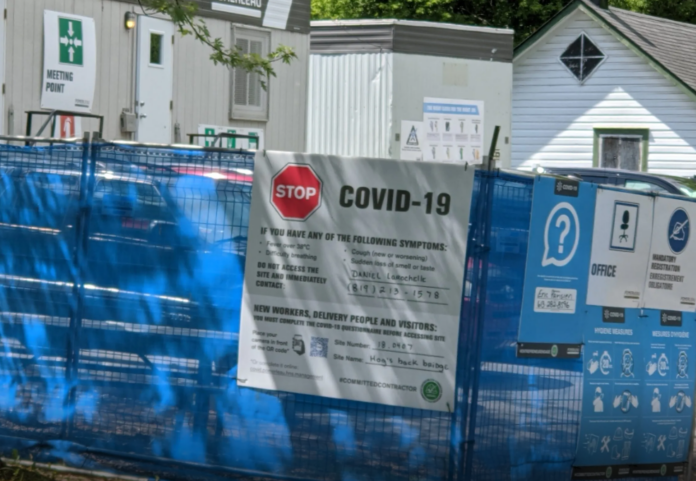Michael Lewis
Special to Ontario Construction Report
Infrastructure Ontario has adjusted contracts to accommodate pandemic risks after settling legal claims from builders who say they were denied compensation for expenses related to the COVID-19 pandemic.
The companies that worked on infrastructure projects deemed essential by the province during the pandemic are demanding payments for implementing sanitization and social distancing protocols and for other expenses caused by the respiratory virus that was first documented in Ontario four years ago.
They say they were denied payment because of the provincial government’s repeated refusal to recognize COVID-19 as an emergency.
“We have amended our contracts in order to revise the way that the risks associated with pandemics are treated moving forward,” a spokesperson for Infrastructure Ontario said.
“Only a few projects still have open claims related to COVID-19,” Ian McConachie added in an email.
“As these matters are before the court, or have otherwise been settled on confidential terms, it would be inappropriate to comment further.”
The Ontario government agency has acknowledged settlements in 67 separate cases related to COVID expenses on government infrastructure projects were work continued during the pandemic. But it has not indicated how much was paid to settle the claims and how many more case remain unresolved.
Ontario says most of the settled cases were resolved through dispute resolution mechanisms built into the contracts and 17 of the settlements stemmed form public-private partnerships.
Those partnerships leverage the expertise and competitiveness of the private sector to modernize Ontario’s aging infrastructure “while reducing cost and protecting taxpayers from the risk associated with these projects,” McConachie said.
Michael Lindsay, CEO of Infrastructure Ontario, told the Toronto Star that details about the settlements are “commercially sensitive” and “confidential.”
He said the pandemic presented “unprecedented realities” that project contracts did not fully anticipate, including mandated safety protocols as well as supply chain disruptions, absenteeism, and project delays.
The consortium of developers suing the province which includes the Aecon Group, Amico Group and Parsons said the failure to recognize emergency status, which would have entitled the companies to more money and time, constitutes a beach of contract. It says the PC government’s refusal to acknowledge the existence of an emergency for its projects “breached its obligations of honest and good faith performance.”
The province argued in court that it is the responsibility of the builders under terms of the contracts to absorb the added expenses caused by the pandemic, suggesting as well that it has been motivated by a desire to insulate taxpayers from COVID-related building costs.
The province had released COVID guidelines for construction sites that mandated the sanitization of equipment, the social distancing of workers and other safety protocols, the lawsuit alleges.
The consortium in 2019 was awarded a $640 million contract to widen a section of the Hwy. 401 from Mississauga to Milton that included an “emergency provision” that should have been triggered by the pandemic, the lawsuit claims. Jean-Louis Servranckx, Aecon CEO, said contracts did not anticipate “extraordinary circumstances like the COVID-19-pandemic.
“Nearly four years after the outbreak of the pandemic, we are still seeking fair and reasonable compensation for these costs.”
Infrastructure Ontario has not yet filed a statement of defence in the Hwy. 401 case, whose allegations have not been tested in court.
Matti Siemiatycki, director of the Infrastructure Institute at the University of Toronto’s School of Cites, said the “pandemic caught societies by surprise” with issues such as allocation of risk in public private partnerships being sorted out in real time.
The province’s view of that allocation suffered a setback in 2021 when the Ontario Superior Court of Justice decision in the Crosslinx v. Ontario infrastructure case ruled that the private sector partners of the Eglinton Crosstown LRT project were entitled to forward a relief claim under the emergency provisions set out in the project agreement due to the impact of the pandemic on the project’s construction schedule.
In December 2021, Infrastructure Ontario and Crown transport agency Metrolinx announced they had reached a $325 million settlement to resolve disputes with the Crosslinx consortium related to the Eglinton Crosstown LRT, including COVID costs.

